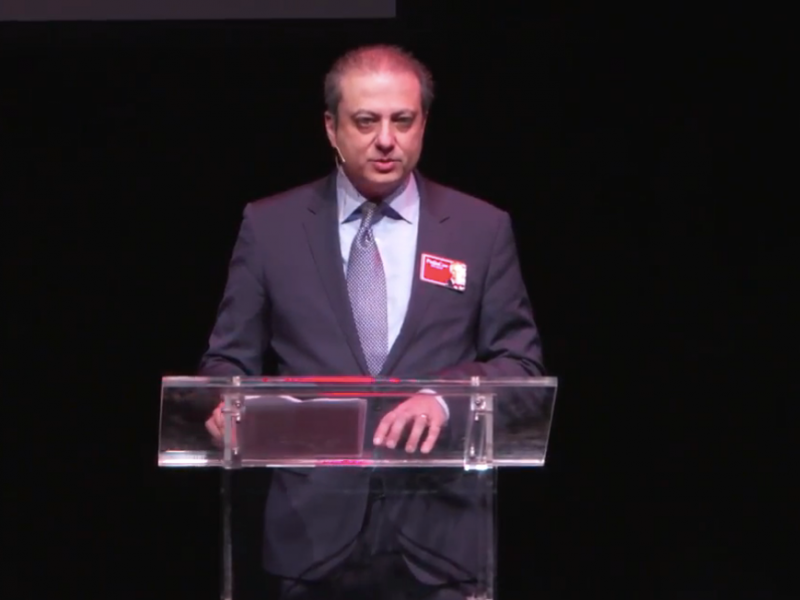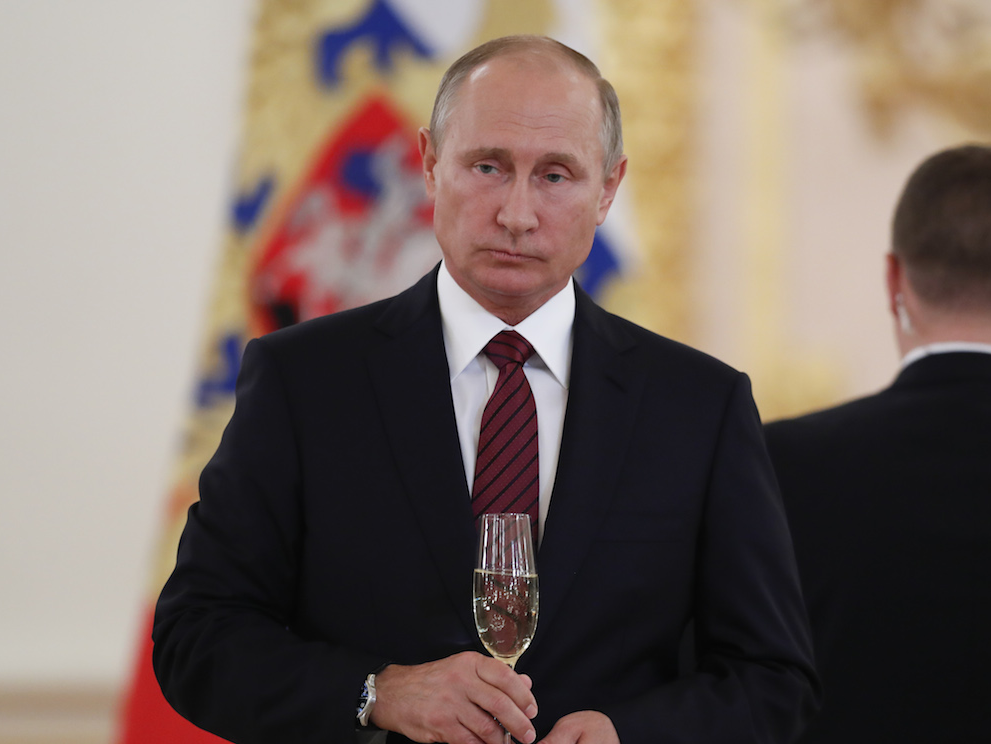- It is clear to people who have watched his rise that Russian President Vladimir Putin has decided the West is his enemy.
- Now it is time for us to understand him as well as he thinks he understands us.
- On Friday, under heavy security, some of Putin’s most vocal critics gathered to explain what people in the West need to know.
- “Putin’s main weapon is propaganda. He knows how to make people into zombies.”
The security at the New World Stages theater in midtown Manhattan on Friday was quite heavy, but you would expect that for a gathering of enemies of one of the world’s most dangerous men: Russian President Vladimir Putin.
Sponsored by the Human Rights Foundation, PutinCon was the first event of its kind – a meeting of dissidents and journalists; of people who’ve been robbed by the Kremlin; of former soldiers who’ve seen too much; of prosecutors and politicians who know too much; of Russians and Europeans and Americans (North and South) who had enough of Putin’s interference and violence.
Being there all day – submerged in dimly lit talks in which a single speaker performed a macabre one-man show describing experiences with Russia’s president – was like a dark meditation.
And at the end, the message was clear: As far away (and weak) as Russia may be, Putin is our problem now – and he has no choice but to make himself such.
Our 'original sin'
To be American is to have the luxury of not having to know how Putin turns people into "others." This is one of the most important pieces of what Putin's enemies had to explain, and it was best articulated by Arkady Babchenko, a renowned Russian journalist who fought in the second Chechen War.
The war, you'll recall, was started after Chechen separatists were blamed for setting off a series of bombs in apartment buildings across Russia in 1999. These bombings turned Putin - then a nobody backed by the unpopular President Boris Yeltsin - into the only man who could save Russia. That made him electable, and so he was elected.
Once in office, Putin set about punishing his enemies. That didn't just mean leveling Chechen cities and going after terrorists, it meant dehumanizing the Chechens. Babchenko was told the Chechens were evil, that any Chechen ages 10 to 60 was a threat to "kill, kill, kill."
"Putin's main weapon is propaganda," Babchenko said. "He knows how to make people into zombies." He did it in Georgia in 2008, and he did it in Ukraine in 2014.
"Today, Russians hate you," said Babchenko, referring to Americans. Putin, running out of Russian money to steal and people to blame for it, has turned his great propaganda machine on the US. That is why he is our problem now.
Now, about those bombings.
Five times in 1999, a bomb was planted in an apartment somewhere in or around Moscow. Four times the bomb went off, killing hundreds. At the time, an American journalist named David Satter was on the ground.
As the government blamed Chechen separatists, the independent press - then still active - told a different story. The bombs were planted by Russia's security force, the FSB. Yeltsin had appointed Putin head of the FSB in 1998.
This was painfully clear when the fifth bomb mercifully did not detonate. The FSB, whose fingerprints were all over the situation, tried to tell people that the bomb was a test, a drill.
"Everything would have worked had it not been for that one mistake," Satter said. He describes this as our "original sin" against Russia - the moment we should've known Putin had to be stopped. But in 1999, Yeltsin was so weak, and it looked as if the Communists might return to power.
And so we, the free world, turned a blind eye to state-sponsored domestic terrorism.
It was, Satter said, an affirmation of the idea that, to Putin, "the individual counts for nothing."
And so it remains.
If you give a moose a muffin
I had a moment to interview Garry Kasparov, the now-exiled Russian chess champion chairing PutinCon. We were speaking as nation after nation condemned Russia for the poisoning of a former spy living on British soil. One moment the spy was alive, and the next he and his daughter were on a park bench approaching death after being poisoned with nerve gas.
Putin, Kasparov agreed, is like the moose in the children's story If You Give a Moose a Muffin. (There's a Mouse/Cookie version too if you prefer that.) The more you let Putin take, the more he'll reach for. The more you allow, the bolder he'll become. There is no red line for him. There is no stopping point, no deed too dark. That is for us to decide. These are important questions. How much should we let Putin steal? How much should we let him kill?
We are, after all, his enablers. You knew that.
A perfect example: There was much talk of how Putin's ill-gotten gains travel the world - how loot leaves Russia to be enjoyed by Putin's billionaire friends who get to live more peaceful lives in nicer places than their countrymen can afford. You knew about that.
It moves from Cyprus, to the British Virgin Islands, to the United Kingdom and/or then to the United States, where it is folded into layers and layers of Delaware companies - laundered by our own bureaucracy and shielded by our unique interpretation of freedom under capitalism.
We're enablers. Remember that you know that.

We needn't be, though. In the afternoon, former US District Attorney Preet Bharara took the stage. He explained how his office managed to nail down foreign nationals who engaged in murder and money laundering on American soil with the blessing of their state. He had done so with individuals from Guatemala, Saudi Arabia, and Turkey. He is banned from traveling to Russia for his efforts.
Bharara said that we can, by upholding the rule of law without exception, stop Putin from killing and stealing. He brought up the Magnitsky Act - a law that is the effort of a single man, Bill Browder. As an investor in Russia a decade ago, he saw his friend, Sergey Magnitsky, murdered and his own money stolen.
That is how Browder, a soft-spoken man with what seems like unlimited patience, became Putin's enemy. The Magnitsky Act stops Putin's cronies from enjoying their ill-gotten gains in the world where it is enjoyable - in our world. It limits their travel and bars them from business here. It is what was discussed in Trump Tower in the summer of 2016 - the meeting that made President Donald Trump's son exclaim, "I love it."
Don Jr., you see, was trying to make friends.
But as Bharara said, "Sometimes you want to judge a person by their enemies, and I don't mind that so much today."

